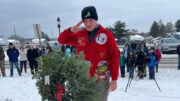BILLINGS, Mont. (AP) — The death of a tourist who left a boardwalk and fell into a boiling, acidic spring in Yellowstone National Park shows the challenges that rangers face as they confront soaring numbers of visitors — including some who break the rules.
No significant human remains were left to recover after Colin Nathaniel Scott, 23, a recent college graduate and nature center volunteer, slipped on some gravel and into the treacherous water, authorities said.
His death comes amid a spike in visitor misbehavior as the 2.2 million-acre park gets more crowded, drawing tourists never exposed to wilderness on such as scale. Scott went off a designated pathway in a geyser basin dotted with dangerous boiling springs and where warning signs sometimes go unheeded.
Only Scott’s sister witnessed the fall, park officials said. The pair had walked about 225 yards off the boardwalk to get closer to some thermal features, which is against park regulations, officials said.
“This is not a resort. This is not a zoo. This is not a farm or ranch. This is a place that will kill you and people are not used to that,” Yellowstone historian Lee Whittlesey said.
The nation’s first national park has seen a string of recent incidents where tourists got into trouble. People got too close to wildlife and others entered dangerous areas in violation of regulations, often to take photos or videos.
A record 4.1 million people visited Yellowstone in 2015. The numbers are up again this year, by 15 percent compared with the same period last year, according to figures released Thursday.
After Scott’s sister reported the fall, rangers navigated over the highly fragile crust of Norris Geyser Basin to try to recover his body. They halted the effort “due to the extreme nature and futility of it all,” park spokeswoman Charissa Reid said.
Only some personal possessions were recovered at the popular attraction, where water temperatures can reach 199 degrees.
Scott had graduated from Oregon’s Pacific University on May 21 with a bachelor’s degree in psychology. He was one of two students named as outstanding seniors in psychology, university spokesman Joe Lang said.
Scott previously worked at the Jackson Bottom Wetlands Preserve in Oregon, volunteering at the education center for about 20 months as part of a work-study program at the university, said Mary Loftin, a manager at the Hillsboro, Oregon, parks and recreation department.
He fielded questions from visitors, including about an eagle that nests on the site, until his stint ended last year. Loftin called Scott a “bright spirit” and said his death was a tragedy.
It occurred in one of the hottest and most volatile areas of Yellowstone, where boiling water flows just beneath a thin rock crust.
Visitors must keep to designated boardwalks when moving among the park’s hot springs and geysers that blast steaming water high into the air, Yellowstone Superintendent Dan Wenk said. He said Scott’s death was a reminder to follow park rules.
At least 22 people are known to have died from hot spring-related injuries in and around Yellowstone since 1890, park officials said. The last occurred in 2000, when a 20-year-old woman working for a park concessionaire died after falling into a hot spring while walking off-trail with two friends at night.
The list also includes at least two people who died after trying to swim in a hot spring, according to Whittlesey, author of the book “Death in Yellowstone.”
“There are few true accidents,” Whittlesey said. “In my opinion, almost all of the incidents are attributable to someone’s negligence.”
By comparison, nine people have been killed by grizzly bears in Yellowstone, at least six by lightning strikes and more than 100 by drowning, Whittlesey wrote. The number one cause of death is traffic accidents, with anywhere from one to 15 fatalities a year on park roads, he said.
Other recent tourist incidents at Yellowstone include a 13-year-old boy who got burned Saturday when his father, who had been carrying him, slipped into a hot spring in Yellowstone’s Upper Geyser Basin.


































